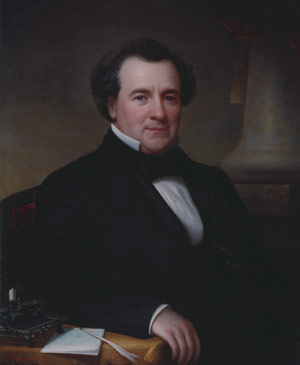Gov. William Fisher Packer of Pennsylvania
Posted By Norman Gasbarro on November 22, 2011
William Fisher Packer was the 14th governor of Pennsylvania. He was a Democrat and served a full three-year term from 19 January 1858 through 15 January 1861, leaving office in the midst of the national crisis. He was succeeded by Andrew Curtin, a Republican, who served two terms which encompassed the Civil War.
Packer’s historical contribution prior to becoming governor was the development of the West Branch of the Pennsylvania Canal and the consolidation and development of the rail line from Sunbury to Balitmore which became the Northern Central Railroad.
Although born in Centre County with family roots in Quaker Philadelphia, his initial enterprise was in Sunbury, Northumberland County, working as an apprentice to the publisher of the Sunbury Public Inquirer. When he became a journeyman printer, he joined the staff of the Pennsylvania Intelligencer in Harrisburg. Eventually, by the time he was 25, he owned several newspapers and was becoming involved in politics. One of those papers, the Lycoming Gazette, took the lead in promoting the development of the canal on the Susquehanna River, a very profitable venture, and his efforts at the newspaper led to his appointment as superintendent of canals for the state.
After several unsuccessful attempts in running for public office, he finally won a seat to the Pennsylvania house in 1847 and within two years was elected speaker. In 1849, he decided to run for the state Senate, and did so, successfully defeating Andrew Curtin. While in the state senate, he took the lead in the establishment of railroads in central Pennsylvania. Without his ardent work and support, the eventual consolidation and development of the lines from Sunbury to Baltimore probably would not have taken place before the Civil War.
In the election of 1856, William Packer supported his friend and fellow Pennsylvanian James Buchanan who won over the new Republican Party candidate John C. Fremont and the Know Nothing Party candidate, former President Millard Fillmore. Packer’s prominence in the campaign and his support for high tariffs which would protect an iron industry weakened by the Panic of 1857, swept him into the governorship in the election that year. One of his opponents was David Wilmot, the Republican candidate who opposed the expansion of slavery into the territories. The Democrats seemed united on the issues, while the Republicans did not.
When Packer took office in 1858, he blamed the banks for the panic because they were freely issuing paper money over the use of gold and silver coin. His plan was to limit the banks to issuing paper currency to an actual amount of real assets that were deposited with the state. Reforms in one state did not really correct the problem, which was that there was no national currency or national policy for the issuance of paper money. As was stated in a previous post, the National Bank Acts which were passed during the Civil War, were an effort to correct the problem on the national level. See Post: Halifax Bank Robbery – Abraham Fortenbaugh.
In addition to the attempt to correct the bank problem, Packer has received high marks by historians for his strong support of the Pennsylvania public schools including specialized training for teachers. The results of this Packer initiative were most obvious in the years following the Civil War.
As his term ended, Packer called for a national convention to resolve the secession crisis and when peaceful attempts to resolve the issues did not come, he urged that secession be treated as rebellion and put forcefully down as such. William Packer did not seek re-election.
During the Civil War, Packer retired to Williamsport, Lycoming County. He stayed completely out of politics. Of his two sons of Civil War draft age, Albert V. Packer (1841-1874) served in the 3rd Pennsylvania Infantry (Emergency Militia) as a Private from 10 September 1862 to about 25 September 1862, and Boyd C. Packer (1843-1908), chose not to serve. Though both registered for the draft in 1863 (see below), neither was drafted.
William Fisher Packer died on 27 September 1870 in Williamsport, Lycoming County, Pennsylvania.
The portrait of William Packer is from the Pennsylvania Capitol Preservation Committee web site. Some of the information for this post was taken from Wikipedia. The 1863 draft registration form for Boyd and Albert Packer is from ancestry.com.
 ;
;




Comments